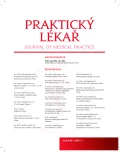Attitude of doctors and managers of outpatient healthcare facilities on received complaints
Authors:
I. Lískovcová
Authors‘ workplace:
Ředitelka: doc. PhDr. Sylva Bártlová, Ph. D.
; Ústav ošetřovatelství, porodní asistence a neodkladné péče
; Zdravotně sociální fakulta
; Děkanka: prof. PhDr. Valérie Tóthová, Ph. D.
; Jihočeská univerzita v Českých Budějovicích
Published in:
Prakt. Lék. 2019; 99(1): 28-32
Category:
Of different specialties
Overview
The complaints area in the health sector is not a regular public topic. Patients know how and where to complain, but it is not possible to find out how many complaints a particular physician has received, for what reason, or whether they are incentive for the provider to implement changes. In the research conducted, the questions were directed to two groups of respondents from the outpatient sphere. These were ambulant private doctors and managers of medium and large outpatient facilities in the Czech Republic. The answers to three questions in both groups of respondents were evaluated. Interest was focused on whether they are willing to disclose the number of complaints received, whether complaints are a source of change for them, and whether changes are being implemented. The second part of the survey focused on the number of legitimate, partially justified and unjustified complaints and the reasons for the complaints received in one of the medium and large health facilities were mapped. The results showed statistically significant differences in the responses of both groups of respondents. The results showed that neither group of respondents is willing to publish the number of complaints. The suggestion to change and implement changes was more strongly confirmed by a group of managers. The second part shows that there are more unjustified complaints and the most frequent reason for the complaints received is the inappropriate behaviour of healthcare workers.
Keywords:
complaints – outpatient sphere – private surgery – medium and large healthcare providers – implementing changes
Sources
1. Dvořáková V. Pochybení a sankce při poskytování lékařské péče. Praha: Grada Publishing 2007.
2. Jay R, Templar R. Velká kniha manažerských dovedností. Praha: Grada Publishing 2006.
3. Kee JWY, Khoo HS, Lim I, Koh MYH. Communication skills in patient-doctor interactions: learning from patient complaints. Health Prof Educ 2018; 2(4): 97–106. Dostupný též z: https://www.sciencedirect.com/science/article/pii/S2452301116301225 [cit. 2018-10-31].
4. Lahnerová D. Asertivita pro manažery: Jak využít pozitiva asertivní komunikace k dosažení svých cílů, 2. rozšířené vydání. Praha: Grada Publishing 2012.
5. Lawrence P, Jarugula R, Hazelwood S, et al. Wait times are not the problem! Detailed analysis of unsolicited patient complaints from a metropolitan Australian emergency department. Emerg Med Australas 2018; 30(5): 672–677. Dostupný též z: https://doi.org/10.1111/1742-6723.12975 [cit. 2018-10-31].
6. Limbeck M. Velká kniha o prodeji: Nový hardselling – Staňte se jedničkou na trhu. Praha: Grada Publishing 2014.
7. Ptáček R, Bartůněk P, a kol. Etické problémy medicíny na prahu 21. století. Praha: Grada Publishing 2014.
8. Ptáček R. Etika a komunikace v medicíně. Praha: Grada Publishing 2011.
9. Škrla P, Škrlová M. Řízení rizik ve zdravotnických zařízeních. Praha: Grada Publishing 2008.
10. Weiss Y, Nachman A. Be a leader, be accountable to patient complaints. GSTF JBio 2018; 2(1): 60–63.
11. Zákon č. 372/2011 Sb. Zákon o zdravotních službách a podmínkách jejich poskytování (zákon o zdravotních službách) [online]. 2011. Dostupný z: https://www.zakonyprolidi.cz/cs/2011-372 [cit. 2018-07-01].
Labels
General practitioner for children and adolescents General practitioner for adultsArticle was published in
General Practitioner

2019 Issue 1
- Advances in the Treatment of Myasthenia Gravis on the Horizon
- Memantine in Dementia Therapy – Current Findings and Possible Future Applications
- Memantine Eases Daily Life for Patients and Caregivers
- Possibilities of Using Metamizole in the Treatment of Acute Primary Headaches
- Metamizole at a Glance and in Practice – Effective Non-Opioid Analgesic for All Ages
-
All articles in this issue
- Život s Crohnem – pohled z kožní ordinace + autentické sdělení pacientky
- Chirurgie a tělocvik
- Odešel nestor olomouckého tělovýchovného lékařství: prof. MUDr. Zdeněk Jirka, CSc. (1928–2018)
- Epidemie chytrých telefonů Nebezpečí pro zdraví, vzdělání a společnost
- Proton radiation therapy in the treatment of solid tumours
- The workload of general paediatricians in Czechia as viewed by the physicians themselves
- Chronic stress as a risk factor for the incidence and progression of cancer?
- Personal dignity of a patient with multiple sclerosis: interpretative phenomenological analysis
- Attitude of doctors and managers of outpatient healthcare facilities on received complaints
- Health literacy of the Romany minority in the Czech Republic
- General Practitioner
- Journal archive
- Current issue
- About the journal
Most read in this issue
- Chronic stress as a risk factor for the incidence and progression of cancer?
- Proton radiation therapy in the treatment of solid tumours
- Personal dignity of a patient with multiple sclerosis: interpretative phenomenological analysis
- Health literacy of the Romany minority in the Czech Republic
